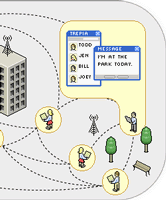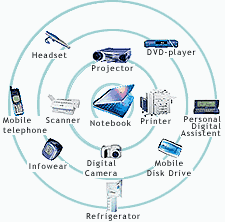| Saturday, May 10, 2003 |  |
|
|
|
 SmartMobs: SmartMobs:Trepia provides a new smartmobbing tool: access a location-based list of other nearby WiFi users. It's not available for Mac yet: please contact Trepia to ask them to accelerate Mac development.(Via Emergent Report)On the surface, Trepia looks similar to a buddy list. While programs like ICQ and AIM will show you a static list of friends, Trepia shows you a list of people who are currently in your area -- people who you most likely didn't know before! You can check out their profile and picture and strike up a conversation, knowing that if you actually want to meet them, they are never more than a few minutes away.
How does it work behind the scenes? If two people are within range of the same Wi-Fi access point, they must be close to each other. Building on this idea, Trepia tracks the movement of people through access points, and then notifies you of other users who are in your area. Trepia is not limited by Wi-Fi's range because it even works when two people are not on the same access point, but the access points themselves are close to each other. That could be good not just for talking, but for an ad hoc economy. Values change when an instant transaction is available is possible in places where it otherwise wasn't. If I'm in the airport and I realize I can't bring that pound of foie gras with me on the plane, I could find somebody else who wants it in a jiffy.
[ Technology | 2003-05-10 14:40 | | PermaLink ] More >
|
|
| Wednesday, May 7, 2003 |  |
|
|
|
 Billboard: Billboard:Apple Service Tops Million First-Week Downloads. Apple Computer says its new digital music service, the iTunes Music Store, sold more than 1 million downloads in its first week, Billboard Bulletin reports. The figure roughly matches the download sales to date by all other digital music services combined, sources say. No wonder. They've actually tried to make something that works for everybody involved. What a concept.
[ Technology | 2003-05-07 16:42 | 0 comments | PermaLink ]
|
|
| Monday, May 5, 2003 |  |
|
|
|
International Herald Tribune: An experiment is under way in Paris that aims to turn the city into one huge Wi-Fi hot spot, making it what could be the first large wireless city in the world.
A dozen Wi-Fi antennas have been set up outside subway stations along a major north-south bus route, providing Internet access to anyone near them who has a laptop computer or personal desk assistant equipped to receive the signals.
The access is free until June 30 but will require paid subscriptions afterward.
If all goes as planned, the private partners building the system expect to make a decision before the end of the year to install at least two antennas, and possibly three, outside each of Paris's 372 Metro stations and to link them through an existing fiber optics network in the subway tunnels. Wi-Fi (wireless networking for your computer) is a great thing. It has the potential for providing cheap or free wireless broadband Internet access, at least in metropolitan areas. Well, many hurdles to overcome, but it is one of the more promising technologies around.
[ Technology | 2003-05-05 21:36 | | PermaLink ] More >
|
|
| Wednesday, April 30, 2003 |  |
|
|
|
 I haven't tried the new Apple iTunes Music Store myself, but my wife adopted it in about five minutes and has been really busy browsing and downloading. I've always said that I'd be perfectly willing to pay $1 per song, so the pricing is right. And from what I understand so far, the copy protection features shouldn't be getting in the way. Although the jury might still be out on whether there's a problem with it somewhere. I haven't tried the new Apple iTunes Music Store myself, but my wife adopted it in about five minutes and has been really busy browsing and downloading. I've always said that I'd be perfectly willing to pay $1 per song, so the pricing is right. And from what I understand so far, the copy protection features shouldn't be getting in the way. Although the jury might still be out on whether there's a problem with it somewhere.
[ Technology | 2003-04-30 21:33 | | PermaLink ] More >
|
|
| Monday, April 28, 2003 |  |
|
|
|
 The Mt.Everest base camp has been online for a couple of weeks now: The Mt.Everest base camp has been online for a couple of weeks now:"Finally, today,14th April 2003 with the contineous effort of the virtual yeti team comprising of DINESH SHILPAKAR, SANJAY SHRESTHA, BISO BAJRACHARYA, TSEWANG DORJEE, PAVAN SHAKYA and myself combined with constant support and advice from great veteran like DAVE HUGHES and GORDON COOK and DILEEP AGRAWAL, we have been able to link EVEREST BASECAMP at an altitude of 5300m at 1300 HRS Nepal standard time to our server based at the base of KALAPATHAR at an altitude of 5450m) wirelessly by using CISCO AIRONET 350 and then to AAP-1 satellite provided by SES Americom and this is the first email."
[ Technology | 2003-04-28 23:59 | 0 comments | PermaLink ]
|
|
| Saturday, April 26, 2003 |  |
|
|
|
 Raymond Powers reports on a company, Genesis World Energy announcing a device that apparently would generate hydrogen from water on demand, to be used in an (almost) regular combustion engine. Raymond Powers reports on a company, Genesis World Energy announcing a device that apparently would generate hydrogen from water on demand, to be used in an (almost) regular combustion engine.The Genesis HICEF is based on a revolutionary technology recently introduced by the Genesis Project in the form of the Edison Device - a residential and commercial energy generation unit that creates gas and electrical power through the separation of hydrogen and oxygen molecules contained in any source of water. At the core of this technology are the Genesis gCells, which break water down into its basic molecular structure through a series of electro-chemical processes, yielding ultra-pure hydrogen and oxygen gases. The reactant chemistry in the Genesis HICEF Technology is different from that of the Edison Device in that the gCells do not require many of the support processes needed in the Edison technology. The water supplying the gCells can be stored in special tanks that replace the ones currently used for gasoline in conventional fossil-fuel vehicles. That would be nice. I don't understand where the energy comes from to do that. But hopefully it actually works.
[ Technology | 2003-04-26 23:47 | | PermaLink ] More >
|
|
| Friday, April 25, 2003 |  |
|
|
|
 A new hydrogen refueling station has been opened in Iceland. You know, for cars running on hydrogen. There aren't many of those yet. The hydrogen is created on the spot from water, using electricity from local geothermal and hydroelectric sources. In other words, that's about as clean and sustainable as it gets. There are a few other hydrogen refueling stations around the world, so it is not the first like it says. A new hydrogen refueling station has been opened in Iceland. You know, for cars running on hydrogen. There aren't many of those yet. The hydrogen is created on the spot from water, using electricity from local geothermal and hydroelectric sources. In other words, that's about as clean and sustainable as it gets. There are a few other hydrogen refueling stations around the world, so it is not the first like it says.
[ Technology | 2003-04-25 19:14 | | PermaLink ] More >
|
|
| Tuesday, April 22, 2003 |  |
|
|
|
 Mikel Maron has a cool visualization of the Blogosphere. You see on the world map in real time what people post on their weblogs. Is it really real time? Anyway, very neat with a different perspective like that. I am fond of global displays. That's how I'd like to get all sorts of information. A display of the world that you can then drill into, to look closer at different parts. Mikel Maron has a cool visualization of the Blogosphere. You see on the world map in real time what people post on their weblogs. Is it really real time? Anyway, very neat with a different perspective like that. I am fond of global displays. That's how I'd like to get all sorts of information. A display of the world that you can then drill into, to look closer at different parts.
[ Technology | 2003-04-22 21:05 | | PermaLink ] More >
|
|
| Sunday, April 20, 2003 |  |
|
|
|
From SmartMobs:"Allen the gadgeteer has created a Java app, available for download to a Motorola i88s phone that records your position and uploads the info to a web site every two minutes. The site displays a map of where you are. You can also mark a location to check the map later to see where the spot you marked is. Instructions on how to load and an explanation of how it works are provided." And Richard Soderberg comments:"Combining the current location system with a layer of identity authentication -- friends on your AIM buddy list, for example, that have permission to see where you're at at all times -- or only during the day.
Location as a publicly exposed digital identity; with a button push, you can hide your identity from everyone but your closest friends, or show it to all as an invitation to come talk while you're resting in a bookstore.
It's socially acceptable to present your willingness converse as an ephemeral "status" on instant messenger; may as well tie that in to real life." Yes, I don't see why not. Except for that I might develop some crazy enemies who will use it to program a personal cruise missile for me, I don't personally see much bad about it.
Well, let me think a little more... I don't really mind informing my friends and family of my whereabouts. I would think it would be fun if my weblog readers could find me on a little map. If it can entertain them to figure out I just walked into a strip club in Palm Springs, all the merrier.
But whether I like that for everybody all the time depends on what kind of behavior patterns others develop around me. I have Instant Messenger programs running all the time on my computer, and I don't mind for most people to know I'm online. But some people think that when I'm obviously there, it automatically means I have time to respond to anything they'll feel like sending me. It doesn't. I might want to retain the option of not talking with you, even though I'm not hiding that I'm at my computer. Likewise, some people might think that if my physical location is visible, it means that they can just come and join me. It doesn't mean that.
But we need some better ways of flagging our availability, or for some algorithm to figure it out. I have a hard enough time getting my family to guess who's phone calls I would want to take and who's I don't at any given time.
[ Technology | 2003-04-20 18:59 | | PermaLink ] More >
|
|
| Friday, April 18, 2003 |  |
|
|
|
From Smart Mobs and Boing Boing we hear that Cory Doctorow has submitted comments to the FCC on "Why WiFi is crucial to the First Amendment". He argues that free speech is being limited when available free wireless bandwidth is being limited."I submitted comments to the FCC today on EFF's behalf, asking it to allocate unused TV frequencies to unlicensed use under the same terms as the 2.4GHz spectrum that WiFi runs in. The cool part was, I got to advocate the position that since the FCC is in the business of regulating who gets to speak, and since WiFi shows that with less regulation, more people get to speak, that the FCC has a First Amendment duty to open up more spectrum for WiFi-like uses. The First Amendment calls on government to eschew regulation of who may speak and how they may speak. Historically, the FCC and FRC's regulatory efforts have balanced the restriction of access to spectrum--which is a proxy for speech, since it is an effective medium of expressive communication--with the need to preserve orderliness in the airwaves so that harmful interference is minimized. The paradigm for this governance held that if anyone were allowed to speak in any way, the resulting chaos of harmful interference would result in a world where no one was heard.
The 2.4GHz experiment, which applied an entirely different paradigm--lightly regulating device characteristics, requiring devices to accept all interference, and allowing anyone to operate a compliant device--challenged technologists to create devices that could function in this very different spectrum environment, coping with contention and interference with technology rather than regulation.
The results have been stellar. The 2.4GHz band has spawned unprecedented innovation in devices and protocols, packing 802.11b, 802.11g, Bluetooth, baby-monitors, X10 cameras, and a host of other communications technologies into a narrow slice of spectrum that was once dismissed as a 'junk band'."
[ Technology | 2003-04-18 22:48 | | PermaLink ] More >
|
|
| Monday, March 31, 2003 |  |
|
|
|
BitTorrent is a new peer-to-peer distribution mechanism for large data files. It makes it possible to share a file without being bogged down with traffic if it happens to become popular. Each person who downloads it becomes a new source of it. Files are both uploaded and downloaded to many places at the same time. See an introduction here on Slashdot. There's apparently not any snazzy graphical interface to it yet, so it still mostly for techies.
[ Technology | 2003-03-31 12:46 | 0 comments | PermaLink ]
|
|
| Saturday, March 22, 2003 |  |
|
|
|
On the Virgin Atlantic flight from L.A. to London they had a v:port in-flight entertainment system. Which is apparently something new, and a bit buggy. But what is cool is first of all that it runs Linux. I discovered that mostly when something went wrong and it had a segmentation fault and rebooted. But it is essentially a video-on-demand system. Around 50 movies to choose from, which you can start and stop and pause and rewind individually. And then games, and you can also send e-mail and SMS to the ground. It all sort of worked, except for that it would pause for long periods of time when other people were busy pushing buttons too.
[ Technology | 2003-03-22 17:01 | 0 comments | PermaLink ]
|
|
| Wednesday, March 12, 2003 |  |
|
|
|
David Weinberger has a nice article at Salon about Internet veteran David Reed's thoughts about spectrum. Governments have divided the radio spectrum into bands that are being licensed to big media companies, giving them basically a monopoly on what is being broadcast. It is all based on the idea that radio and TV signals interfere with each other, so there can only be one entity broadcasting on a given frequency in a given area. Interference was a problem with old radio equipment, but it is no longer a valid limitation. Reed says:"Interference is a metaphor that paints an old limitation of technology as a fact of nature."
"There's no scarcity of spectrum any more than there's a scarcity of the color green. We could instantly hook up to the Internet everyone who can pick up a radio signal, and they could pump through as many bits as they could ever want. We'd go from an economy of digital scarcity to an economy of digital abundance." So, any guess as to why we aren't doing that? Who could possibly benefit from keeping all radio spectrum monopolized in the hands of large media corporations and the military? Gee, that's a hard one.
[ Technology | 2003-03-12 21:48 | | PermaLink ] More >
|
|
| Friday, March 7, 2003 |  |
|
|
|
 Bluetooth seems to be becoming a really cool thing. Even though I haven't succeeded in getting very far with it myself. For the uninitiated, Bluetooth is a standard that allows cellphones, headsets, handhelds, laptops, or whatever, to communicate wirelessly with each other over short distances, like when they're within the same room. I've got a Nokia 6310i phone with bluetooth and GPRS (for always-on Internet kind of stuff) and a Palm handheld with a bluetooth card. The idea was that the Palm would use the phone (while still in my pocket) for Internet connection, and be able to run ICQ instant messaging all the time. Well, I succeeded in making that work only once or twice, for a short period of time. The phone seems to have trouble connecting and disconnects often. It seems like other owners of the 6310i have similar problems, and I probably should have chosen the Sony Ericsson T68, which was what my cell provider actually recommended, and which apparently does bluetooth beautifully. The bluetooth adapter for my Palm m505 is kind of fragile the way it sticks out, so it wouldn't really be practical to leave it plugged in in my pocket. And I just had to have the Palm serviced because the connector for the little bluetooth card no longer held it in. And even when I got the connection to work, I realized quickly that my Palm organizer shut off after two minutes or so, breaking the connection, so there was no way I could keep ICQ running. Anyway, others are having more fun. Bluetooth seems to be becoming a really cool thing. Even though I haven't succeeded in getting very far with it myself. For the uninitiated, Bluetooth is a standard that allows cellphones, headsets, handhelds, laptops, or whatever, to communicate wirelessly with each other over short distances, like when they're within the same room. I've got a Nokia 6310i phone with bluetooth and GPRS (for always-on Internet kind of stuff) and a Palm handheld with a bluetooth card. The idea was that the Palm would use the phone (while still in my pocket) for Internet connection, and be able to run ICQ instant messaging all the time. Well, I succeeded in making that work only once or twice, for a short period of time. The phone seems to have trouble connecting and disconnects often. It seems like other owners of the 6310i have similar problems, and I probably should have chosen the Sony Ericsson T68, which was what my cell provider actually recommended, and which apparently does bluetooth beautifully. The bluetooth adapter for my Palm m505 is kind of fragile the way it sticks out, so it wouldn't really be practical to leave it plugged in in my pocket. And I just had to have the Palm serviced because the connector for the little bluetooth card no longer held it in. And even when I got the connection to work, I realized quickly that my Palm organizer shut off after two minutes or so, breaking the connection, so there was no way I could keep ICQ running. Anyway, others are having more fun.
A Swedish programmer came up with a way of using his cellphone for remote controlling his Macintosh. The latest Mac laptops come with built-in bluetooth, and it apparently talks beautifully with Sony Ericsson phones. So this guy made a program that allows you to start and stop music on the Mac. And other people are coming up with new scripts. Like, the Mac can know when you walk into the room, and can start picking up your e-mail, and that kind of thing.
And for those of you who've actually played with bluetooth connections, and noticed that all the cellphone and computer really found in the local wireless area was each other, this from BoingBoing is cool:"I am in Levi, Finland, at a meeting where we are talking and playing and working wireless. I pull out my laptop, fire up the bluetooth manager to connect with my cell phone to dial up a connection and ... whoa ... is this slooooow ... where *did* the connection go ... and just when I am about to give up I see hundreds of bluetooth devices on my laptop's bluetooth manager! Headsets, phones, devices, all revealing themselves in low security mode. It's a shock, as I can hardly believe my eyes. Like looking at a Windows Networking window at a LAN party or conference, but these are phones and devices and laptops aplenty. Later I try it in my room and the same thing happens, with a few less connections but the same effect..." It is a couple of years since I was in Helsinki, but it certainly was cellphone central with everybody being glued to a Nokia phone.
[ Technology | 2003-03-07 11:20 | | PermaLink ] More >
|
|
| Wednesday, March 5, 2003 |  |
|
|
|
Dean Kamen, inventor of the Segway scooter, and many other interesting things, introduced last Thursday a portable water purifier that he hopes will save millions of people around the world from shortages of fresh water. It is a 100 pound device which requires little maintenance and uses no chemicals or filters. It uses a specialized distillation and condensation process and produces 10 gallons of clean water an hour on 500 watts of electricity. The idea is that it goes hand in hand with a generator he's also developed, which uses a Stirling engine to produce electricity.
[ Technology | 2003-03-05 23:59 | | PermaLink ] More >
|
|
| Monday, March 3, 2003 |  |
|
|
|
 Westerville, Ohio is installing a 250-kilowatt fuel cell, which will power 180 homes. It is apparently the first of its kind in the U.S. It will be a 28-foot-long, 85,000-pound unit, built by FuelCell Energy of Danbury, Connecticut. As any other fuel cell, it generates energy from hydrogen by a simple chemical process. In this 'direct' approach, natural gas is the source, and the hydrogen doesn't even have to be separated out from the gas first. The unit makes little noise. Nothing is burned and it simply produces water which will be discharged directly into a city sewer. The electricity produced will still cost more than electricity produced by conventional means, but it is part of a more long term plan. As part of its Third Frontier initiative, Ohio plans to spend $103 million on fuel-cell research during the next three years. Westerville, Ohio is installing a 250-kilowatt fuel cell, which will power 180 homes. It is apparently the first of its kind in the U.S. It will be a 28-foot-long, 85,000-pound unit, built by FuelCell Energy of Danbury, Connecticut. As any other fuel cell, it generates energy from hydrogen by a simple chemical process. In this 'direct' approach, natural gas is the source, and the hydrogen doesn't even have to be separated out from the gas first. The unit makes little noise. Nothing is burned and it simply produces water which will be discharged directly into a city sewer. The electricity produced will still cost more than electricity produced by conventional means, but it is part of a more long term plan. As part of its Third Frontier initiative, Ohio plans to spend $103 million on fuel-cell research during the next three years.
[ Technology | 2003-03-03 23:59 | | PermaLink ] More >
|
|
| Monday, February 24, 2003 |  |
|
|
|
 Smart Mobs mentions an article about the results of studies of cell phone usage, partularly among young people in Japan. The keitai (cell phone) use is so pervasive that it is effectively 100% for teenage girls. And now, the standard cell phones you get for free from the phone company have color screens, built-in cameras, Internet connectivity, etc. Particularly, the prevalent text messaging habits will seem strange to Americans, as text messaging hasn't really caught on here yet. Smart Mobs mentions an article about the results of studies of cell phone usage, partularly among young people in Japan. The keitai (cell phone) use is so pervasive that it is effectively 100% for teenage girls. And now, the standard cell phones you get for free from the phone company have color screens, built-in cameras, Internet connectivity, etc. Particularly, the prevalent text messaging habits will seem strange to Americans, as text messaging hasn't really caught on here yet.High school and college students generally do not have the home phone numbers of any but their closest friends. Before initiating a call to a keitai, they will, almost without exception, begin with a text message to determine availability; the new social norm is that you should "knock before entering." By sending messages like "Can you talk on the phone now?" or "Are you awake?" text messagers spare each other the rude awakening and disruption of a sudden phone call.
One teenage couple that participated in our study exchanged 30 text messages over the course of three hours as they watched television, ate dinner and did their homework, before engaging in a one-hour phone conversation. This voice contact was followed by another trail of 22 messages that kept them in contact until bedtime.
Keitai-wired youth are in persistent but lightweight contact with a small number of intimates, with whom they are expected to be available unless they are sleeping or working. Because of this portable, virtual peer space, the city is no longer a space of urban anonymity; even when out shopping, solo youths will send photos to friends of a pair of shoes they just bought, or send fast-breaking news about a hot sale that is just opening. After meeting face-to-face, a trail of text messages continues the conversation as friends disperse in trains, buses and on foot, nimble thumbs touch-typing on numeric keypads.
Just as Weblogs are distributing journalistic authority on the Internet, mobile media further de-centers information exchange by channeling it through networks that are persistently available to the mobile many. There are some things I find appealing about that whole thing, about being in constant contact, even though I don't use my cellphone like that so far. Here's another article . People are less concerned about being late for appointments, because they're in constant contact. And they walk slower than they did 10 years ago, because they're always on the phone.
[ Technology | 2003-02-24 18:21 | 0 comments | PermaLink ]
|
|
| Sunday, February 23, 2003 |  |
|
|
|
(For the uninitiated, RSS is the format used to create syndicated "feeds" from weblogs, which can be picked up by "aggregator" programs.) Joi Ito asked his readers about opinions on whether it is nice to include full text in one's RSS feeds or not. I had been thinking about the same. Some feeds have only a one line summary, others have full, long articles. I've been a bit uncertain on how to configure my own program here, to make most people happy. Seems like the answer Joi got was to make several feeds, so people can get what they want.
One remaining question I would have is what to do about pictures. Most of my posts have pictures, but I leave those out of the RSS feed, because I figure some people would feel they don't belong in the news feed itself. Some people post lots of huge pictures in their feed. Hm, I suppose the answer is the same: to have multiple feeds with different options.
[ Technology | 2003-02-23 23:59 | 0 comments | PermaLink ]
|
|
| Tuesday, February 18, 2003 |  |
|
|
|
 This is what I want: resources of all kinds that are filtered and ranked according to people I trust and respect. This is what I want: resources of all kinds that are filtered and ranked according to people I trust and respect.
I assume it is a complicated problem, since I don't have it yet, because I'm for sure not the first person to think about it. But I believe it can be solved, if some capable person can work out the math.
The Google PageRanking mechanism is the most successful collaborative ranking mechanism there is, which is able to successfully operate on a huge dataset. For those of you who for some strange reason don't know, Google will rank webpages not only based on what words appear in them and how prominently they appear, but based on how many other websites carry link to that particular page, and how many websites carry links to those websites, and so forth, producing a surprisingly accurate and fair ranking mechanism.
I wouldn't know how to implement that myself. But the basic formulas are available, and Google does it with hundreds of millions of pages, so of course that can be figured out.
But what I want is to do a personalized version of that kind of thing, based on choices I've made about other people, other websites, or about anything else, like books or movies or brands of shampoo. I want not just to get the aggregate 'best' choices, chosen by all websites in the world. I want the best choices by people I know, like, respect or trust, or by the people that they again know, like, respect or trust. And I want a similar, complicated huge matrix calculation that adds all of that up, just for me. And for you.
I'm also talking about involving more dimensions than just the number of links. I want to add up the qualitative judgements of people I have a high opinion of, or that I'm likely to have a high opinion of. So, the further that gets from the choices I explicitly already made, the less value they'd have.
No, I'm not just talking about Amazon being pretty good at recommending books I might want to read. They do that well, and it is a practical and working example of collaborative filtering, but I doubt that their math is very fancy, as they really just recommend other popular choices in the categories I've looked in myself.
I want the algorithm that accurately and fairly adds up the collective advice implicitly given to me by my friends and friends of friends by their aggregated choices, weighted by how trusted their opinions are in relation to me. I mean, I suspect that it is just a formula and an algorithm for calculating a ranking value. Something that can be explained in abstract math, and then we can go and figure out what specific values are included and where they'd come from. If it is impractical to calculate at this point without quantum computers, I'd like to know that too. But I suspect it is perfectly feasible to do this well.
[ Technology | 2003-02-18 03:07 | | PermaLink ] More >
|
|
| Monday, February 17, 2003 |  |
|
|
|
 Boeing are doing successful tests of planes with broadband Internet connections. 20-Mbit/second satellite connection for each plane, with ethernet by each seat. Still just a test, but they hope to install it more widely in 2004. Boeing are doing successful tests of planes with broadband Internet connections. 20-Mbit/second satellite connection for each plane, with ethernet by each seat. Still just a test, but they hope to install it more widely in 2004.
Thomas Madsen-Mygdal mentioned a little while ago that the linx train between Copenhagen and Gothenburg is the first train with a broadband connection.
What is interesting for both is not just that passengers can access the net, but also that it opens new possibilities for the crew, and better interactivity with the surrounding world. The train, for example, might be better at reporting its own position, and the crews in the planes might be more able to do their own flight planning.
[ Technology | 2003-02-17 23:59 | | PermaLink ] More >
|
|
<< Newer stories Page: 1 2 3 4 5 6 Older stories >> |

